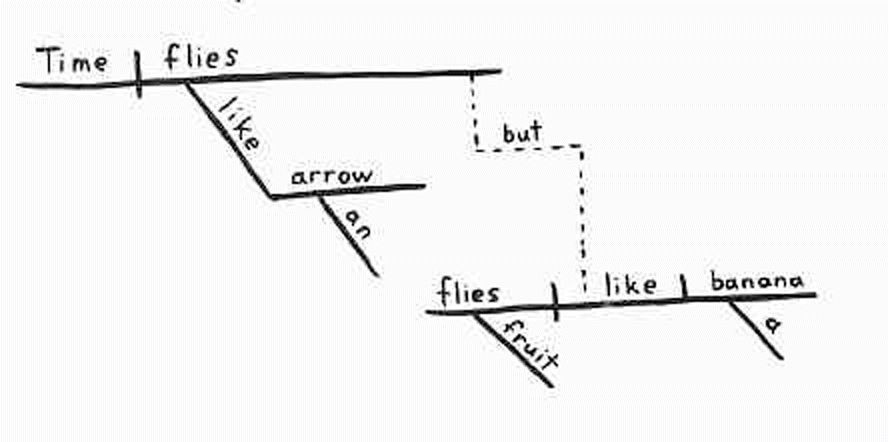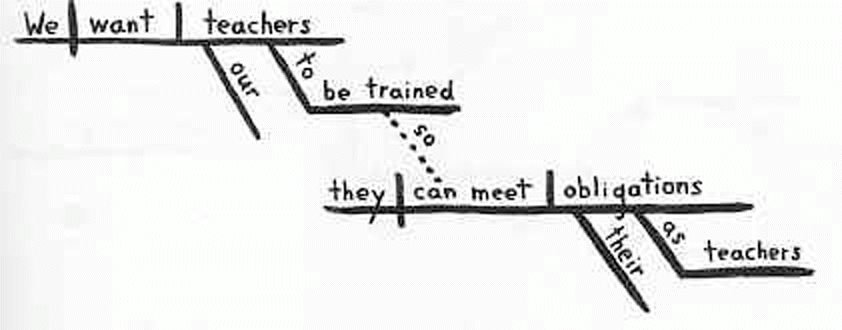
Sister Bernadette's
Barking Dog
The Quirky History
And Lost Art of
Diagramming Sentences
Kitty Burns Florey
(Harvest)

Ms. Florey has an addiction. Like all addictions, it seriously affects her life, makes her say (and write) strange (and sometimes wondrous) things; at times, it drives her (and her readers and presumably her friends) to distraction.Her habit has to do with the perfectibility of the English language, and the supposed ability of all of us to use it wisely and well. Her "kit" --- to borrow a phrase from the street --- is called "diagramming."
She, apparently, can pull it out and give herself a hit any time of the day, in any situation. She may be listening to a presidential speech, reading a newspaper or book, or even, god knows, plowing through Marcel Proust --- and out it comes, and in a trice, she has the lines on the page, the sentence in question plotted out perfectly, a virtual verbal work-of-art.
Diagramming did not always bode well for some of us. You remember Mrs. DeGraffenreid's class back at Fishweir Grammar. Plump, opinionated, no-nonsense Erika DeGraffenreid. Long straight chalk lines across the blackboard. Little lines sprouting here and there, some straight up, some bending east or west like last winter's palms after the storms. Big lines heading down, going south. Dotted lines darting off here or there. And the sweet mystery of it all. Let's see if we can still remember how she taught us:
Diagramming | is | habit
\strange
\very
\aWhat sets Ms. Florey's book off against any other I have read about diagramming is that (1) I can understand it; (2) Even if I still don't get diagramming any more than with Mrs. DeGraffenreid, I can still enjoy it, because (3) Ms. Florey is willing to put the litmus test to anyone, including Hemingway, John Updike, Mark Twain, William Faulkner, Henry James' ("The Jolly Corner" --- takes two full pages) ... and Proust (not shown) in what is said to be the longest of his sentences, a 958 word stinker from Sodome et Gomorrhe able to take up the entire wall in your kitchen or hall.
She would lead us to believe that this is a book about diagramming, but like any good and worthy opus, it has dozens of sub-texts: the beauties of English, the author's passion for English, the writing of good English. She also has a marvelous take on authors as disparate as Fenimore Cooper, Eudora Welty, Jack Kerouac, F. Scott Fitzgerald and Gertrude Stein: "I dipped a toe into her Lectures in America. To my astonishment, I found myself dipping another toe, then both feet, until before I knew it I was in up to my neck and flailing wildly as I struggled not to be sucked under by her astonishing prose." Stein
sounds like a strange mix of James Joyce, George W. Bush, Lewis Carroll's White Knight, and the precocious three-year-old grandson of a friend of mine.

Speaking of Bush, she has a fine time with one of his speeches, not only quoting it, but going on to diagram it [see above.] The rest of it can be found on page 58, a page filled with a gorgeous structural illustration of what the President of a supposed literate country told the citizens to expect of teachers: "We want them to know how to teach the science of reading in order to make sure there's not this kind of federal --- federal cufflink." Ms. Florey's drawing is pure starch macaroni, it doesn't repeat the word "federal," but it somehow figures out what to do with "cufflink."§ § § Ms. Florey delights in finding proofreading errors. She quotes from the bible of the industry of American literary perfection, The New Yorker: "After drinking it I wondered for several moments if I would wretch." Her footnotes, placed conveniently, as all should, alongside the text, can be read as a separate commentary. On the word "ain't," she announces:
It | ain't \ impossible
---------------------------------------------Then she starts in on "youse." For me, this was no problem at all, for in Mrs. DeGraffenreid's school classroom there in North Florida, the second person plural always came out as "you all" or, more efficiently, "y'all." (After they sent me off to school in New Jersey, because of unfriendly classmates' snickers, this entirely logical usage got subsumed to the less exact "you." "Over yonder" yielded to the far less satisfactory "over there.") Florey tells us that "youse" is "part of standard speech for several of my aunts, my neighbors, and half the people on the G train out of Brooklyn on a given morning."
To me, it's a natural addition to English: it's the plural you --- our vous --- and sometimes it seems quite handy. When my aunt Cora asks, "Do youse want a piece of pie?" she's addressing everyone at the table, not just one favored cousin.
"When my landlord asks me, 'So when do youse want me to come and fix the terlet?' he wants to make it clear that he's fixing the toilet for both my husband and me, not just me --- which might sound a bit saucy." Footnote by the author:
I would consider my life seriously impoverished if he stopped calling a toilet a terlet and that big thing in the cellar the erl tank.
§ § § It is rare for this crusty reviewer to stop in the midst of reading a book and try a Holden Caufield. Remember, the hero of The Catcher in the Rye becomes intent on calling up Thomas Hardy to compliment him on creating Eustacia Vye. Well, halfway through Sister Bernadette's Barking Dog, I was beset with the thought of ringing up Florey to tell her what a pistol of a book she had put together. Being of the email generation, I satisfied myself with an email directed to her website,
www.KittyBurnsFlorey.com Well, as her landlord might have opined, I shudda stood in bed. Her reader message (or massage) line must be out-of-service, out-of-town, or out-of-sorts. Or maybe my billet-doux was a bit too loving. I'm still waiting for what we used to call a "bread-and-butter" letter.
No matter. This one is hot. You and your grammar, not to say your Grandma, have nothing to lose by getting and devouring it. With or without the butter and the cufflinks.
--- L. W. Milam